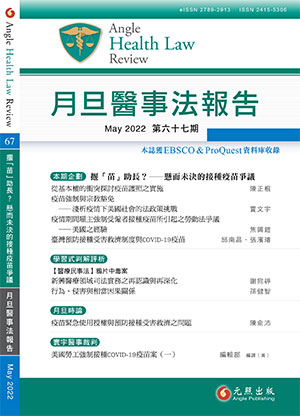從基本權的衝突探討疫苗護照之實施【本期企劃】 試閱
Discussion on the Implementation of Vaccine Passport from the Conflict of Fundamental Rights
實施疫苗護照係全球面對新冠肺炎之害,所擬採取的重要防疫措施,經由證明辨識疫苗接種之有無,防止未有接種人士成為疫情破口而繼續擴大傳播,此項措施涉及憲法健康權之實踐,然而經探討疫苗護照仍為廣義醫療資訊之一環,依據憲法資訊自決權之理念,其資訊隱私仍應受保護。針對兩項主要基本權之衝突,立法者可給予衛生主管機關法源依據,以實踐人民健康權,他方面亦須檢討現行醫療資訊隱私保護相關法律,不得對人民醫療資訊之隱私造成過度之干預限制。因人民可主張資訊自決權,更具體落實則即為醫療資訊隱私權之保護,相關主管機關仍應輔導或向人民宣示,針對相關具體作為,倘若人民有不服意見或有損害人民權益,應經由行政爭訟保護其權利,甚或經由憲法訴訟以釐清其合憲性。
The implementation of vaccine passports is an important anti-epidemic measure to be taken in the face of the harm of the COVID-19 in the world. Through proof, identification of whether or not to be vaccinated can prevent people who have not been vaccinated from becoming a breach of the epidemic and continue to spread. This measure involves the constitutional right to health. However, it has been discussed that vaccine passports are still a part of broad medical information, and their information privacy should still be protected according to the concept of the constitutional right to self-determination of information. In response to the conflict between the two main basic rights, legislators can provide the competent health authority with a legal basis to practice the right to health of the people. Others must also review the current laws on the protection of medical information privacy and not cause excessive interference with the privacy of people’s medical information. Because the people can claim the right of information self-determination, and the more specific implementation is the protection of the right to privacy of medical information. The relevant competent authorities should still provide guidance or declare to the people that if the people have any dissatisfaction or harm the people’s rights and interests. They should go through the Administrative disputes protect their rights, or even go through constitutional proceedings to clarify their constitutionality.
007-020






